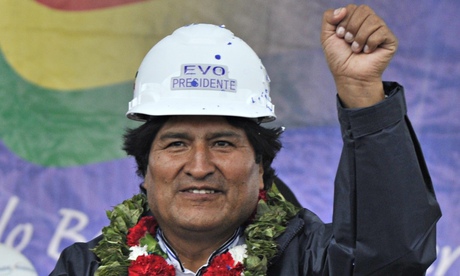 Ellie Mae O'Hagan
Ellie Mae O'Hagan 
The socialist Evo Morales, who yesterday was re-elected to serve a third term as president of Bolivia, has long been cast as a figure of fun by the media in the global north. Much like the now deceased Hugo Chávez, Morales is often depicted as a buffoonish populist whose flamboyant denouncements of the United States belie his incompetence. And so, reports of his landslide win inevitably focused on his announcement that it was “a victory for anti-imperialism”, as though anti-US sentiment is the only thing Morales has given to Bolivia in his eight years in government.
More likely, Morales’s enduring popularity is a result of his extraordinary socio-economic reforms, which – according to the New York Times – have transformed Bolivia from an “economic basket case” into a country that receives praise from such unlikely contenders as the World Bank and the IMF – an irony considering the country’s success is the result of the socialist administration casting off the recommendations of the IMF in the first place.
According to a report by the Centre for Economic and Policy Research (CEPR) in Washington, “Bolivia has grown much faster over the last eight years than in any period over the past three and a half decades.” The benefits of such growth have been felt by the Bolivian people: under Morales, poverty has declined by 25% and extreme poverty has declined by 43%; social spending has increased by more than 45%; the real minimum wage has increased by 87.7%; and, perhaps unsurprisingly, the Economic Commission on Latin America and the Caribbean has praised Bolivia for being “one of the few countries that has reduced inequality”. In this respect, the re-election of Morales is really very simple: people like to be economically secure – so if you reduce poverty, they’ll probably vote for you.
It’s true that Morales has made enemies in the White House, but this is probably less to do with rhetoric than the fact that he consistently calls for the international legalisation of the coca leaf, which is chewed as part of Bolivian culture but can also be refined into cocaine (via a truly disgusting chemical process). Before Morales was first elected, the Telegraph reported: “Decriminalisation would probably increase supply of the leaf, which is processed into cocaine, providing drug traffickers with more of the profitable illicit substance.” In fact the opposite has happened – in the past two years, coca cultivation has been falling in Bolivia. This inconvenient fact is a source of great consternation to the US government, which has poured billions of dollars into its totally ineffective and highly militaristic war on drugs in Latin America. Morales has – accurately in my view – previously implied that the war on drugs is used by the US as an excuse to meddle in the region’s politics.
Having said this, it would be dishonest to argue that Morales’s tenure has been perfect. Earlier this year the Bolivian government drew criticism from human rights groups for reducing the legal working age to 10. But what most news outlets neglected to mention is that the government was responding to a campaign from the children’s trade union, Unatsbo, which sees the change in legislation as a first step to protecting Bolivia’s 850,000 working children from the exploitation that comes with clandestine employment. Although Bolivia has made massive strides in reducing poverty, more than a million of its citizens still live on 75p a day – a legacy of the excruciating poverty of Bolivia before Morales took office.
Nevertheless, Morales must make reducing the number of child workers a priority during his third term. Not doing so will be a serious failure of his progressive project. In terms of social reforms, Morales should heed recent calls from the public advocate of Bolivia, Rolando Villena, to legalise same-sex civil unions and pave the way for equal marriage. He should also follow the lead of Uruguay’s president, José Mujica, and completely liberalise abortion, which would be a good first step to tackling the country’s high rates of maternal mortality. And Morales must also address the criticism of indigenous leaders who accuse him of failing to honour his commitments to protect indigenous people and the environment.
But however Morales uses his third term, it’s clear that what he’s done already has been remarkable. He has defied the conventional wisdom that says leftwing policies damage economic growth, that working-class people can’t run successful economies, and that politics can’t be transformative – and he’s done all of this in the face of enormous political pressure from the IMF, the international business community and the US government. In the success of Morales, important political lessons can be found – and perhaps we could all do with learning them.
More likely, Morales’s enduring popularity is a result of his extraordinary socio-economic reforms, which – according to the New York Times – have transformed Bolivia from an “economic basket case” into a country that receives praise from such unlikely contenders as the World Bank and the IMF – an irony considering the country’s success is the result of the socialist administration casting off the recommendations of the IMF in the first place.
According to a report by the Centre for Economic and Policy Research (CEPR) in Washington, “Bolivia has grown much faster over the last eight years than in any period over the past three and a half decades.” The benefits of such growth have been felt by the Bolivian people: under Morales, poverty has declined by 25% and extreme poverty has declined by 43%; social spending has increased by more than 45%; the real minimum wage has increased by 87.7%; and, perhaps unsurprisingly, the Economic Commission on Latin America and the Caribbean has praised Bolivia for being “one of the few countries that has reduced inequality”. In this respect, the re-election of Morales is really very simple: people like to be economically secure – so if you reduce poverty, they’ll probably vote for you.
It’s true that Morales has made enemies in the White House, but this is probably less to do with rhetoric than the fact that he consistently calls for the international legalisation of the coca leaf, which is chewed as part of Bolivian culture but can also be refined into cocaine (via a truly disgusting chemical process). Before Morales was first elected, the Telegraph reported: “Decriminalisation would probably increase supply of the leaf, which is processed into cocaine, providing drug traffickers with more of the profitable illicit substance.” In fact the opposite has happened – in the past two years, coca cultivation has been falling in Bolivia. This inconvenient fact is a source of great consternation to the US government, which has poured billions of dollars into its totally ineffective and highly militaristic war on drugs in Latin America. Morales has – accurately in my view – previously implied that the war on drugs is used by the US as an excuse to meddle in the region’s politics.
Having said this, it would be dishonest to argue that Morales’s tenure has been perfect. Earlier this year the Bolivian government drew criticism from human rights groups for reducing the legal working age to 10. But what most news outlets neglected to mention is that the government was responding to a campaign from the children’s trade union, Unatsbo, which sees the change in legislation as a first step to protecting Bolivia’s 850,000 working children from the exploitation that comes with clandestine employment. Although Bolivia has made massive strides in reducing poverty, more than a million of its citizens still live on 75p a day – a legacy of the excruciating poverty of Bolivia before Morales took office.
Nevertheless, Morales must make reducing the number of child workers a priority during his third term. Not doing so will be a serious failure of his progressive project. In terms of social reforms, Morales should heed recent calls from the public advocate of Bolivia, Rolando Villena, to legalise same-sex civil unions and pave the way for equal marriage. He should also follow the lead of Uruguay’s president, José Mujica, and completely liberalise abortion, which would be a good first step to tackling the country’s high rates of maternal mortality. And Morales must also address the criticism of indigenous leaders who accuse him of failing to honour his commitments to protect indigenous people and the environment.
But however Morales uses his third term, it’s clear that what he’s done already has been remarkable. He has defied the conventional wisdom that says leftwing policies damage economic growth, that working-class people can’t run successful economies, and that politics can’t be transformative – and he’s done all of this in the face of enormous political pressure from the IMF, the international business community and the US government. In the success of Morales, important political lessons can be found – and perhaps we could all do with learning them.

